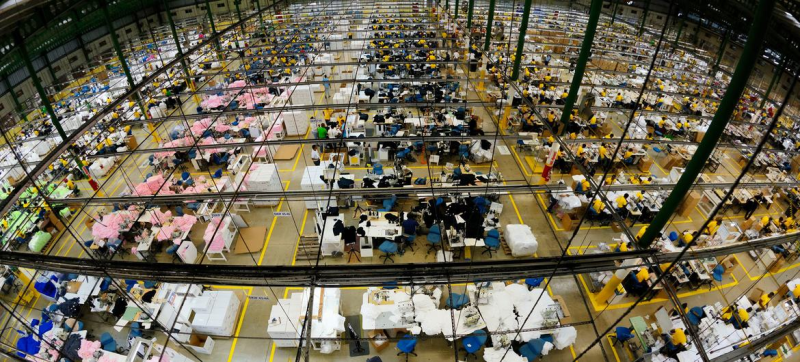- India Sees 9% Drop in Foreign Tourists as Bangladesh Visits Plunge |
- Dhaka Urges Restraint in Pakistan-Afghan War |
- Guterres Urges Action on Safe Migration Pact |
- OpenAI Raises $110B in Amazon-Led Funding |
- Puppet show enchants Children as Boi Mela comes alive on day 2 |
Tariff Uncertainty Puts Labour Standards at Risk: ILO

Employees work at a garment factory in Haiti
Garment factories around the world that have signed up to implement UN-backed labour standards may stop investing in improving working conditions due to widespread uncertainty over tariff levels, according to the International Labour Organization (ILO).
Threatened or actual tariff increases—mainly targeting imports into the United States—are expected to make products from overseas factories more expensive, potentially reducing demand.
The ILO’s Better Work programme, a partnership with the International Finance Corporation (IFC), supports garment factories, many of which export their products to the United States.
Sara Park of the ILO explained to UN News what could happen next.
Sara Park: Better Work currently operates in the garment, textile, and footwear sectors in 13 countries around the world. It was set up 24 years ago in Cambodia to monitor working conditions in garment factories. Since then, it has focused on improving factory conditions and building the capacity of stakeholders in the sector, including in occupational safety and health.
Other key components include promoting social dialogue, decent work, fair wages, and reasonable working hours. The programme has also helped enhance productivity in these sectors.
UN News: How is the ILO involved?
Sara Park: The ILO is a tripartite organisation, working with governments, employers, and workers’ unions—usually through labour ministries, but also through ministries of trade or commerce since the programme is export-focused.
What differentiates us from other projects is our close collaboration with major brands from the US, UK, Europe, and Japan to promote responsible business practices.
UN News: How successful has this programme been?
Sara Park: Our studies show significant impact at the factory level. For example, wages have increased, and gender equality has improved, with more women assuming supervisory roles.
Over its 25-year existence, Better Work has helped lift millions out of poverty and reduce the environmental impact of the apparel sector by fostering decent work in sustainable enterprises.
However, unions still face challenges, especially around freedom of association.
Developing a competitive industry takes years, even decades, but we've observed improvements in the factories we support. Many Better Work-enrolled factories have reported increased orders from buyers.
UN News: So this benefits business as well?
Sara Park: Absolutely. It enhances productivity in individual factories. Governments also tell us that the programme builds investor confidence, contributing to industry-wide growth.
UN News: Has Better Work been affected by global funding changes?
Sara Park: Yes. Recent US government funding cuts have impacted our programmes in Haiti and Jordan, which were heavily US-funded. Fortunately, other countries have not been affected due to diverse funding sources.
UN News: Why is continued ILO support needed after factory-buyer relationships are established?
Sara Park: Buyers, often well-known global companies, require a sustainable way to monitor working conditions and ensure compliance with international labour standards. This is key to minimising risk.
Better Work conducts assessments, advisory sessions, and training, helping all stakeholders better understand and comply with the standards. We also work with governments, employers, and workers to build institutional capacity.
UN News: How is the current tariff uncertainty affecting the garment sector?
Sara Park: The full impact is still unknown. Governments are monitoring the situation, while employers and unions are deeply concerned.
The uncertainty makes short-term planning nearly impossible for factories, which don’t know how many orders they will receive or whether they can afford to pay workers. If Better Work factories close, many jobs may shift to the informal sector, where worker protections are far weaker.
In countries like Jordan, for example, most garment workers are migrants from South and Southeast Asia.
UN News: How is investment being affected globally?
Sara Park: Investment typically pauses during crises or uncertain periods. One concern is that factories will halt improvements to working conditions, affecting occupational safety and health.
For instance, heat stress is a serious issue. In Pakistan, temperatures recently reached 50°C. Without investment, necessary measures to protect workers may not be implemented.
UN News: What would you say to a worried garment worker?
Sara Park: We understand many workers are anxious. The ILO continues its work to protect them and remains committed to improving conditions across sectors and countries.
We will keep promoting social dialogue, as it's the most effective way to achieve improvements at the factory, sectoral, and national levels.

